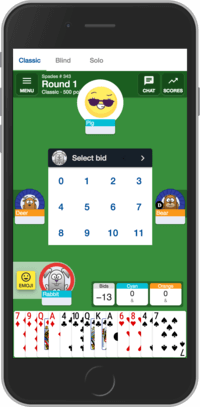Overview
Spades is a trick taking game where teams of players try to be the first to win 500 points in the games. Spades is played with 3 to 12 players, individually or divided in teams of two. 4 players divided into two teams.
Ranking of Cards
In Spades, Aces are high and 2s are low. Spades are always the trump suit.
Summary
- Spades is always the trump suit
- Each player sets their own bid for each round
- If they meet their contract, players score 10 points for each trick in the contract and 1 point for every extra trick won
- For every 10 extra tricks won, the team loses 100 points
Presets
- Classic: Gameplay as outlined in this guide
- Blind: Players can choose to bid nil, before they look at their hand
- Solo: Players play as individuals, rather than as teams. If a player holds a card which could win the trick, they must play it
- Suicide: At least one player on each team must bid nil every round, minimum bid of 4 is also enforced
- Mirror: Players must bid the exact number of spades cards you hold
- Whiz: Players must bid nil or the exact number of spades cards you hold
Play Multiplayer Spades Online
The Deck and the Deal
Spades is played with a standard deck of 52 playing cards. For 3 to 5 players, 1 deck is used; for 6 to 8 players, 2 decks are used; and for 9 to 12 players, 3 decks are used.
For 3 players, 17 cards are dealt to each player from a deck without the 2 of Diamonds.
For 4 players, 13 cards are dealt to each player.
For 5 players, 10 cards are dealt to each player from a deck without the 2 of Diamonds or the 2 of Clubs.
For 6 players, 17 cards are dealt to each player from a deck without both 2 of Diamonds.
For 7 players, 14 cards are dealt to each player from a deck without both 2 of Diamonds, 2 of Clubs, and 2 of Hearts.
For 8 players, 13 cards are dealt to each player.
For 9 players, 17 cards are dealt to each player from a deck without all three 2 of Diamonds
For 10 players, 15 cards are dealt to each player from a deck without all three of the 2 of Diamonds and the 2 of Clubs.
For 11 players, 14 cards are dealt to each player from a deck without two of the three 2 of Diamonds.
For 12 players, 13 cards are dealt to each player.
How to Play
Each player declares a number of tricks as their bid for the round. Players can also bid nil, anticipating that they will not win any tricks in the round. Beginning with the dealer and going clockwise, players try to play the highest ranked card in order to win the trick. No player can lead a trick with Spades until a Spade has been played on a previous trick or they have only Spades in their hand.
Won tricks are collected by the winner and placed to the side.
Scoring
For winning at least as many tricks as the team's combined bid, the team scores 10 points for each trick in the bid. Tricks in excess of the bid only score 1 point each and are called 'bags'.
Whenever a team accumulates 10 bags, they lose 100 points - 10 points for each bag. The number of bags needed for the penalty points can be changed from the Options menu.
Winning
The game ends when a team reaches 500 points; Whoever has the most points at that time is the winner. The target can also be set to 250, 300, 400, 600 or 700 points. The game also ends if a team loses so many points that they go below the target points in the negatives.
Variations
CardzMania supports several customizable rules and options so you can play Spades exactly how you like or how you grew up playing with your friends and family. In addition to the classic way of playing, we often have new creative options for you to try to spice up the game if you are interested in trying different spins for fun.
Points
Players determine a set amount of points when the game ends.
Rounds
Players determine a set amount of rounds (also known as hands or deals) that the game will go to (instead of the points selection above).
Timer
Players only have a set amount of time to make their turn after which a turn is automatically played for them and the game proceeds: Fast is 7 seconds, Standard is 15 seconds, Slow is 30 seconds, and Very Slow is 60 seconds. Players can also choose to disable the timer, but that is only for private tables.
Jokers
Players can decide to add 1 or 2 Joker cards to the deck. When playing with jokers, they are the highest trump card. With both jokers, the red joker is higher than the black joker.
Deuces High
When enabled, players can make a certain number of Deuces high. Including the Deuces previous in the sequence, the ranking of Deuces are as follows from high to low: (1) Spades, (2) Diamonds, (3) Clubs, (4) Hearts. The Deuces rank below the Jokers if they are also enabled.
Mirror
This variation is available for the solo preset if you want to play solo mirror, otherwise use the mirror preset for teams. Players can only have one mirror or one whiz enabled.
Whiz
This variation is available for the solo preset if you want to play solo whiz, otherwise use the whiz preset for teams. Players can only have one mirror or one whiz enabled.
Closed Bidding
When enabled, players bid simultaneously, rather than in the regular turn based manner.
Min Bid
When enabled, players can determine the min bid allowed. The options are 2, 3 or 4. This variation is only applicable without mirror.
Nine Bid
When enabled, players can allow a bid of 9. This variation is only applicable without mirror.
Ten for Two Hundred
When enabled, a successful bid of 10 will result in 200 points as opposed to the standard 100 points
Min Team Bid
When enabled, players can determine the min team bid allowed. The options are 2, 3 or 4. This variation is only applicable without mirror.
Hook
When enabled, the dealer is allowed to make the final bid equal to total cards or not (like in Oh Hell). This variation is only applicable without mirror.
Blind Nil
When enabled, players can bid a nil without looking at their cards. This is worth double the points.
Blind Pass
When enabled, players can pass 2 cards to their partner when playing a blind bid. This Happens after bidding and before trick play. This can also be set to 1 or 3 cards.
Half Blind Penalty
When enabled, the usual penalty for failing the bid is halved when playing a blind bid.
Low Clubs Start
When enabled, the person with the lowest clubs starts as opposed to the person next to the dealer.
Lead trump (Spades)
When enabled, this changes the circumstance under which Spades cards can be first played. The available options are:
- Spades broken (played)
- After first trick
- After three tricks
- After three tricks or spades broken (played)
- Anytime
Must Win
When enabled, a player must play a card if it can win them the trick. This is only applicable with the solo preset.
Pass
When enabled, team members can pass cards to each other before bidding. The available options are 1, 2 or 3 cards.
Bags
When enabled, this changes the number of bags at which the team incurs a penalty equal to the number of bags multiplied by 10. For low target scores (100, 200, 250), this can be set to 1, 2, 5 or 10 (default).
Nil Bonus
When enabled, this allows bonuses for nil bids. The available options are 50, 100 or 200.
Nil tricks count
When enabled, Nil tricks count towards partners' tricks.
Failed bid
When enabled, failing to win a bid of 5 incurs penalty points. The available options are -10 or -50 points.
Spades Strategy
You have to pay close attention how your partner bids and your opponents bids as well especially when there is a nil bidder as thats a bonus of 100 points. Players often try to target the nil bidder first and although it is not common, but if the opposing team bids double nil i.e. both partners bid nil for a total of 200 points, your team should really focus on making them win a trick by leading smaller cards. There are many different variations and version of spades, and we support upto 12 spades players i.e. 6 teams per game.
Trick Basics
Trick Taking games center around having the highest ranked card in a draw. Typically, players of trick taking games sit in a circle, sometimes in teams and sometimes playing solo, and are dealt a hand of cards. Given the specific game's card ranking (and trump - special suit that beats other suits), players draw a card from their hand in hopes that it outranks the other cards played. The player who outranks the others wins the trick for that round and gameplay is repeated until the cards are exhausted. Typically the player or team with the most tricks wins the game.
In a trick, each player plays a single card. One player is selected to start, then play proceeds clockwise around the table. If possible, players must play a card which is the same suit as the first card played - this is called 'following suit'. If a player cannot follow suit, then they may play any card in their hand. Based on the cards played, one player is declared the winner of the trick, usually for playing the highest value card of the trump suit, or of the suit of the card which started the trick.
After all cards have been dealt, normal trick taking commences. Remember all cards of the suit declared as trump (trump cards) beats any other suit. Whichever team wins seven tricks out of thirteen wins the round, winning all thirteen tricks is referred to as court. If the dealers team achieves this feat, its called a goon court. In single sir, winning the first seven consecutive tricks constitutes a court.
After cards dealt, depending on the trump, you have to figure out your strategy for the game whether to play trump first or not. In single sir / single sar winning the first seven tricks constitutes as a court or a goon court, so the strategy is very different than double sir / double sar. Whichever team (dealers team or trump callers team) wins seven tricks wins the deal and the opposing team becomes the dealer. In double sir, you have to win two consecutive tricks, so the strategy is totally different as you need to keep another high card to win the pile. Note that the second and the second last trick cannot be won, so you have to be extra careful about that too. This game is played in many variations so you have to be extra careful about the rules.
Based on the cards played, one player is declared the winner of the trick, usually for playing the highest value card of the trump suit, or of the suit of the card which started the trick.
Hand
The cards that a player is dealt forms their hand. Each round, a player selects one of the cards in their hand and plays them into the pile. In most trick taking games, all players are dealt the same number of cards and the hand is hidden from the other players, but in some games, like 500, a player can reveal their hand for bonus points.
Pile
The pile is the spot where players place their chosen card for the round. The player with the highest ranked card receives all of the cards in the pile and sets them to the side. In most trick taking games, the individual cards in the pile have a specific point value that is given to the winner.
Dealer
The dealer is chosen at random and passes out the deck of cards to form each player's hand. In most games, the dealer position rotates to the left once the deck needs to be re-shuffled and re-dealt.
Trump
Arguably the most important part of any trick taking game, the trump suit is the highest ranked suit in the game. Every game has its own method of selecting trump. Some games leave the selection up to the winner of the bid while some games make the suit of the lead card the trump suit.
Order
The ranking of the cards is dependent on the game. Ace is usually considered the highest in trick games, but some games from Europe, like Klaverjassen, have the Jack of trump the highest card.
Auction/Bidding
Most trick taking games contain an auctioning/bidding phase at the beginning of gameplay. During this time, players take turns bidding how many tricks they expect to win in the game. The player with the highest bid leads the first trick and decides the trump suit in most games. Often times, if the winner of the bid, sometimes called the declarer, fails to win the amount of tricks they bidded, they receive a lot of penalty points
Lead Card
The Lead card is the first card in the trick. In most trick taking games, subsequent players need to play the suit of the lead card if they can.
Card Game Basics
A deck of cards consists of 52 cards, with 4 distinctive subgroups. Each of these subgroups is recognised by a symbol and are referred to as suits. They consist of Clubs, Spades, Hearts and Diamonds. Each suit contains 13 cards which, generally, are considered in this order, Ace (A), 2, 3, 4, 5, 6, 7, 8, 9, 10, Jacks (J), Queen (Q) and King (K). Some games include the two Jokers found in a standard deck but most games don't.
Feedback
Would like to discuss new features or variations for Spades? Need a custom rule? Have a question? Got a suggestion? Don't see a game you want to play? Please contact us by
email, facebook or twitter - we really value your feedback and love hearing from all of you!
This site uses cookies. By continuing to browse the site you are agreeing to our use of cookies.




